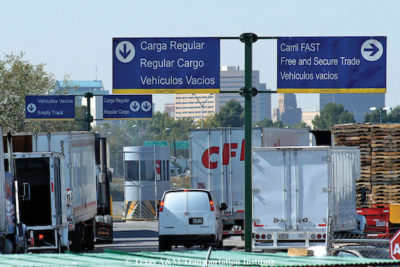
State lawmakers meeting in Laredo on Friday heard testimony from Rafael Aldrete, a Senior Research Scientist at the Texas A&M Transportation Institute, to inform their discussions on border crossing wait times and related trade implications.
The House Committee on Transportation and the Committee on International Relations and Economic Development met on the campus of Texas A&M International University. The official assignments to the committees by House leadership call examining the “infrastructure at international border ports of entry in Texas and identify transportation-related impediments to international trade that negatively impact the state” and making “recommendations to reduce border wait times, facilitate economic growth, and expedite trade.”
Aldrete briefed committee members on how the trade relationship between the United States and Mexico has grown steadily in recent years, and how that growth has contributed to worsening congestion at border crossings. He outlined how TTI’s Center for International Intelligent Transportation Research has developed a system to monitor crossing times. The highly accurate real-time travel information available through this system shows great promise for improving the capability to inform numerous decisions, such as route planning by logistics companies, to expedite the movement of goods and people between Texas and Mexico border ports of entry.
“While many factors influence crossing times, technology has emerged which enables us to factor trip planning into the border-crossing process,” Aldrete told members. “Currently, a system is in place to report travel times across the state’s largest ports of entry, but building on this existing technology with new methods could mitigate congestion at ports of entry, expediting crossing times and enhancing efficiency.”
The U.S. exports more than $265 billion and imports more than $346 billion in goods from Mexico annually, including products such as machinery, mineral fuels, medical equipment and vehicles, as well as produce. Exacerbated by infrastructure and security agency limitations, border crossing wait-times have increased dramatically.
Lengthy wait times have implications for numerous involved stakeholders, which has a direct impact on economic development for local communities as well as the state and the nation. Long waits create time and labor constraints for freight companies and law enforcement. They can cause delays in the supply-chain, affecting other companies, and can even render products unusable (in the case of spoiled produce).
Aldrete explained to the committee members how the accuracy of travel times benefits numerous stakeholders, and emphasized how technology investment can add value to road and bridge investment, promising improvements for both security and efficiency.
“TTI’s enhanced system would allow the traveling public to make better routing decisions much earlier and thus help balance traffic loads at ports of entry within that same region,” he said, “which could enable those transportation and border agencies to make better-informed operational choices.”